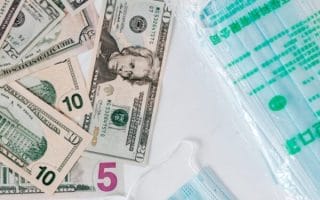The drumbeat of recession talk continues to grow louder in the media and amongst financial analysts. The housing crisis, the credit crunch, high energy prices, the falling dollar, inflation, and slowing consumer spending are all contributing to a troubled economy. While no one can see into the future and know for certain whether or not there will be a recession in 2008, it’s not unwise to take a few steps now to protect yourself in case a recession does come to pass.
The biggest problems people face during a recession are layoffs and inflation. Both put a strain on the family budget, but neither is insurmountable, particularly if you do a bit of planning and saving beforehand to protect yourself. Here are some simple steps you can take that will help you ride out a possible recession without too much damage to your financial picture.
First, retool your resume, start networking, and pick up some additional skills to increase your marketability. If the economy tanks, companies will have to cut spending and this often means layoffs. You should be prepared for a job hunt, particularly if you work in an industry or for a company that is particularly shaky. Having an updated resume and a rolodex full of contacts gives you a head start should a layoff happen. Use this time to learn new skills such as new software programs, business management, a foreign language, etc. The more skills you have the more valuable you are, both to your current employer and a prospective employer. When layoffs happen, companies usually let the least skilled, least valuable workers go first. Additional skills may act as an insurance policy for your job if the worst happens.
Second, start putting more money in your emergency fund, or start one if you don’t have one. If you get laid off, you’ll need to rely on your emergency fund until you find a new job so start pumping some extra money in there. Keep your emergency stash in an account with no withdrawal penalties, and make certain you’re getting a good interest rate.
Third, start curbing your spending now, rather than waiting until you’re forced by circumstance to do so. Cut down on unnecessary spending and use that money to fund your emergency fund. Maybe you want to put off some travel (particularly international travel since the exchange rate is so poor right now), home remodeling, a car purchase, moving, or other big expenses and instead save that money in case you need it. The less you live without now, the more money you’ll have saved if you have to go without a paycheck for a while. Those who wait until the layoff happens to slow their spending are starting from behind.
Fourth, refinance or pay off any debt that’s at a variable interest rate and don’t incur any additional debt. This includes credit cards, adjustable mortgages, home equity lines of credit, etc. Interest rates are probably going to go up and this will increase your payments. In the case of credit cards, if you are laid off or have other financial problems that cause you to miss a payment or pay late (on any bill, not just the card in question), you are subject to their “universal default” policy which basically means that if they see something on your credit report they don’t like, they are free to raise your rate sky high. For this reason, don’t take on any more credit card debt, particularly if you feel like hard times may be ahead of you.
Fifth, learn money saving and frugal skills now. Learn how to cut your grocery bill by using coupons and shopping the sales. Try stockpiling food bought at low prices to avert price increases and to have a stash in case you need to cut spending even more. Learn which stores have the best prices on which products. Become familiar with the consignment and thrift stores in your area and their offerings and prices. Learn how to do more for yourself such as lawn care, home maintenance and repair, and cooking. Cut your utility bills by conserving power, water and fuel. Cut your gas bill by driving less and consider trading the gas guzzler for a more fuel efficient model. Every bit of money you can save by doing something cheaper or on your own is more that you can save in case you need it. You’ll also curb some of the effects of inflation on your budget.
Sixth, get the advice of a professional financial advisor that you trust to help direct your investment strategy. I’m not a stock market guru so I can’t tell you where you should be investing money at this time. But there are plenty of professionals out there who can help protect your investments in a troubled economy. If you have a lot of money in stocks or bonds (this includes 401k’s), get some help from a professional. They’ll advise you as to which “safer” areas are good bets for earning decent returns during a recession.
We don’t know for certain that a recession is coming and, if so, how bad it might be. But there are indicators in the economy that we might be heading that way. Don’t be caught by surprise. Take some steps now to protect your financial future. What’s the worst that can happen? You’ll save up a bunch of money, be prepared to look for a new job, become more self reliant, and take some steps to protect your investments. Not a bad strategy, even if we don’t have a recession.
Image courtesy of wallyg

Jennifer Derrick is a freelance writer, novelist and children’s book author. When she’s not writing Jennifer enjoys running marathons, playing tennis, boardgames and reading pretty much everything she can get her hands on. You can learn more about Jennifer at: https://jenniferderrick.com/.







Comments